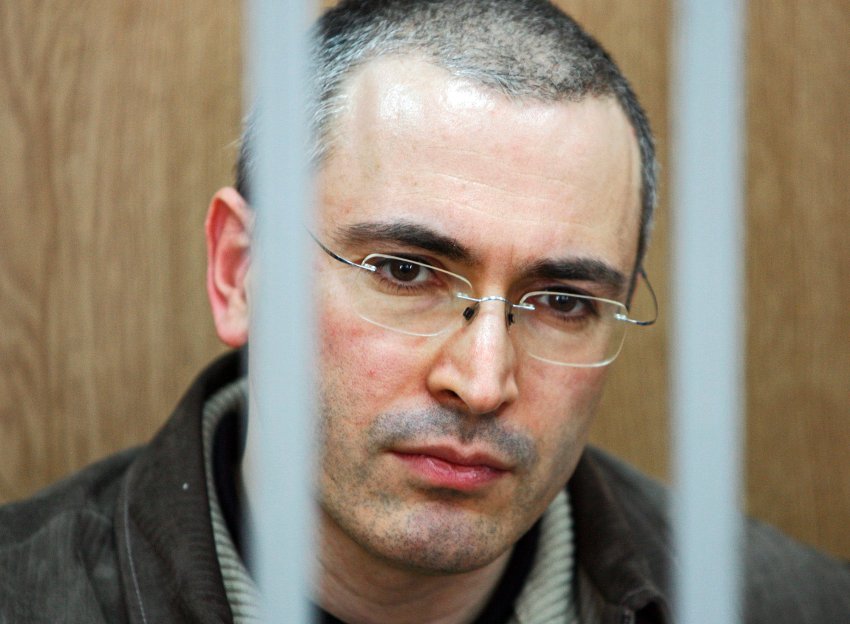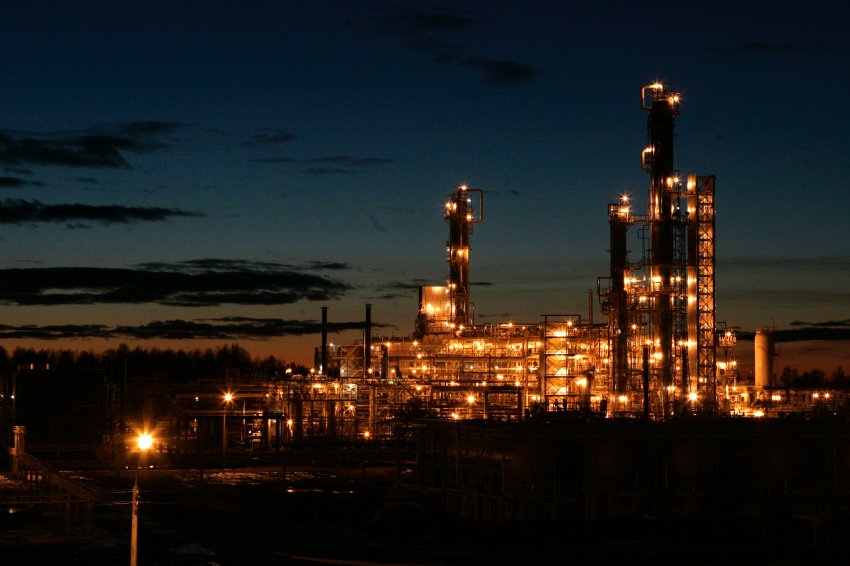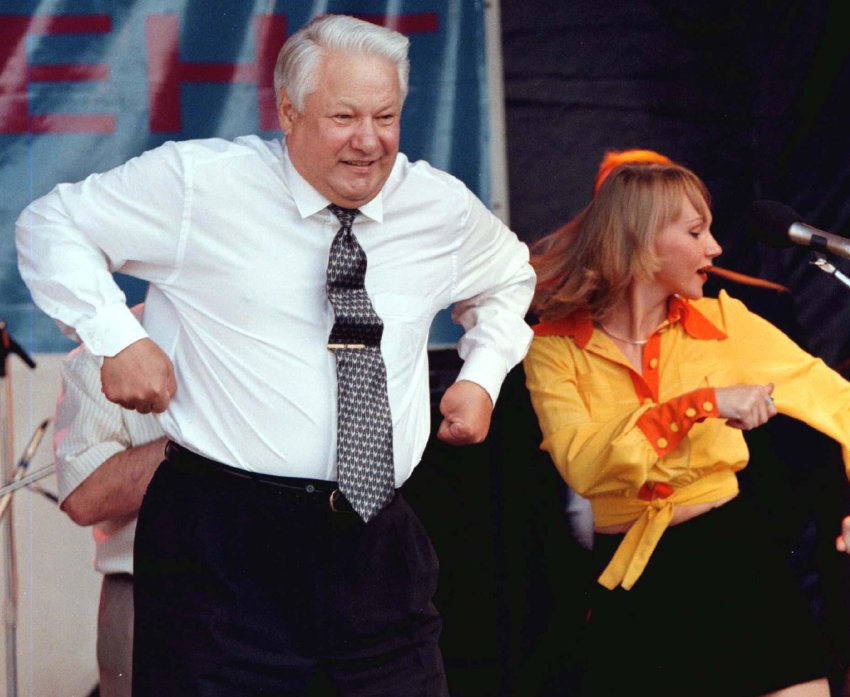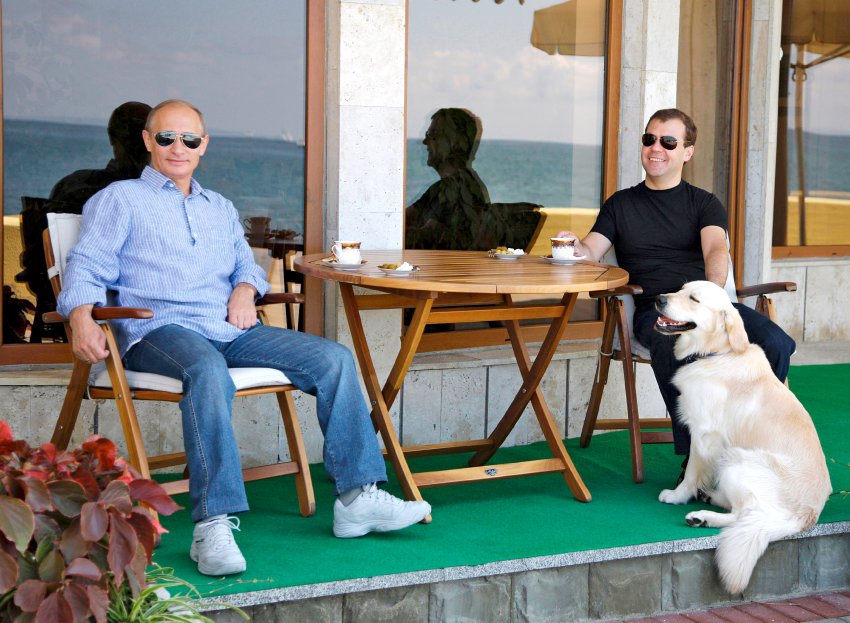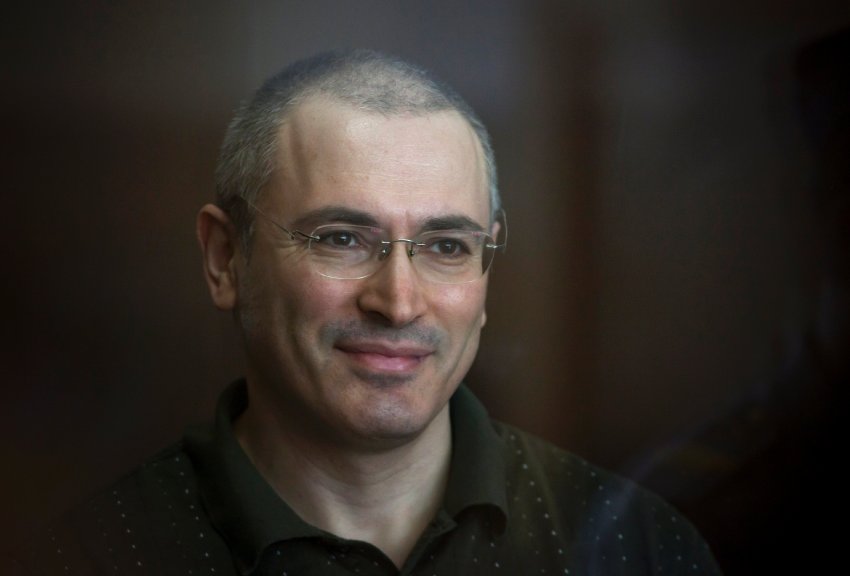Mikhail Khodorkovsky sits in a defendant’s cage in a Moscow courtroom in this June 16, 2004 file photo. In a lengthy interview published in this week’s issue of SPIEGEL, he argues: “I was not a rober baron in the past, just as I’m not a martyr today.”
SPIEGEL interview, Mikhail Khodorkovsky, 47, the former Russian oil magnate and head of the Yukos Oil Company, discusses his path to becoming one of the country’s richest men, his transformation into a dissident, his seven years in prison and the policies of Prime Minister Vladimir Putin.
During the free-for-all years under Russian President Boris Yeltsin, Mikhail Khodorkovsky emerged as the posterboy for fledgling capitalism in post-Soviet Russia. But he has spent the past seven years in Siberian labor camps and Moscow prisons. The son of a Jewish father, Khodorkovsky was born in Moscow in 1963. In 1987, during the era of Gorbachev’s reforms, he used his connections as an official with Komsomol, the Communist Union of Youth, to found one of the country’s first private firms. It imported and sold computers, alcohol and other goods. Using his profits, he invested in the expansion of one of Russia’s first private banks.
Soon after, he acquired 78 percent of the shares in the oil firm Yukos. Khodorkovsky developed the company into an empire, with 100,000 employees and over $11 billion in revenues in 2002. In 2003, Forbes magazine ranked him as the world’s 26th richest man, estimating his private assets at $8 billion.
Khodorkovsky used his name recognition to openly criticize Vladmir Putin, despite the fact that Putin, then president, had called on the country’s oligarchs to hold back and exercise political reserve. On Oct. 25, 2003, the Russian secret service arrested Khodorkovsky as the airport in Novosibirsk. He was then prosecuted on charges of tax evasion and fraud and sentenced to eight years in a labor camp.
Putin’s advisors even admitted that “an example” was being set with Khodorkovsky. Currently, a second trial is taking place against the oil magnate, with a verdict expected by the end of the year. This time, Khodorkovsky stands accused of embezzling 350 million tons of oil worth approximately $25 billion. If convicted, he could face an additional 15 years in prison.
Over the course of several weeks, Khodorkovsky answered questions posed by SPIEGEL editors through a complicated exchange of letters.
SPIEGEL: Mr. Khodorkovsky, you have been behind bars in Russia for a long time now, and you are as familiar with Siberian prison camps as you are with detention centers in Moscow. What has been your experience of the Russian prison system?
Khodorkovsky: The penal system in our country does not emphasize reeducation, providing help for those convicted or protecting society from crime. Instead, it merely emphasizes the punishment — often a brutal and degrading punishment, which is designed to break a person.
SPIEGEL: What does your day look like?
Khodorkovsky: I’m not an ordinary prisoner. In almost seven years of imprisonment, I spent only one year and two months in the prison camp to which the court sentenced me. I’ve spent the rest of the time in various detention centers, where I was almost always involved in preparations for the trial and court hearings. I’ve been in Moscow for the past year and a half, in the Sailor’s Silence Prison. My days are shaped by the trial and the prison regime. I am in court on business days, except for one day a week, when I work with my attorneys.
SPIEGEL: How often do you see your family?
Khodorkovsky: Sometimes I see my family members on that one day in the week, and then we spend an hour or an hour and a half talking through a telephone, because we’re separated by a thick pane of glass. Of course, guards are always there, too. It’s been like this for almost seven years now.
SPIEGEL: Why didn’t you take advantage of the opportunity to emigrate in 2003, when it was becoming clear that you were going to be arrested — like media mogul Vladimir Gusinsky, who fled to Spain, and oligarch Boris Berezovsky, who now lives in London?
Khodorkovsky: I felt that I had no choice at the time. Emigrating would have meant betrayal. My honor was more important to me. I still feel this way today.
SPIEGEL: Were there attempts to negotiate a deal for your release at the time? For example, in which you would declare yourself guilty and be allowed to go abroad in return?
Khodorkovsky: No. As far as I know there were never any such talks.
SPIEGEL: And how likely is a pardon by President Dmitry Medvedev?
Khodorkovsky: Under the constitution, the president has the right to pardon anyone who has been convicted of a crime. There are no restrictions. But you’d have to ask President Medvedev about that.
SPIEGEL: Two members of the government, the former economics minister and the current industry minister, recently testified in court that they were not aware of any violations of the law by Yukos. Is this a positive sign for your next verdict?
Khodorkovsky: That would be drawing a rather optimistic conclusion from their testimony. The statements are more indicative of the personal integrity and professionalism of these people.
SPIEGEL: For outsiders, there are two things that are still very difficult to fathom: Your fairytale path to becoming one of Russia’s richest men and your transformation from a loyal citizen to a dissident. You studied at an institute for arms research in the 1980s, and you worked with the KGB. Why did you suddenly change your views about Russia’s leadership?
Khodorkovsky: I have always defended my convictions and what I believed to be the truth. When it became clear to me that we were all being deceived during the Soviet era, I took to the barricades. Since then, the demand for free speech has been my most important concern. The break-up of the (last independent) television network NTV in 2000, in particular, forced me to take a more critical approach toward the Kremlin.
As far as my successes as a businessman are concerned, you have to go back to 1987. At the time, a handful of people like me decided to gamble a future guaranteed by the state in return for an uncertain career as an entrepreneur. And in 1996, an equally small number of people decided to invest all of their hard-earned money in a semi-defunct company, which Yukos was at the time, and to do so six months before an election that everyone expected the communists to win. I took that gamble — and won.
Yukos Was the Country’s Third-Largest Taxpayer’
SPIEGEL: You were an advisor to the last head of the Russian Soviet Republic, and in you worked in the Energy Ministry 1993, under then-President Boris Yeltsin. At the same time, you were also the chairman of one of Russia’s first private banks — during the hottest phase of privatization, no less. Wasn’t that the same fusion of the economy and politics that you criticize so sharply today?
Khodorkovsky: The bank that I owned only became involved in the energy and fuel business two years after I had left the public sector, in 1995, that is. Today, people at senior levels of political power are intertwined with business in a completely different way. I think it’s dangerous.
SPIEGEL: Your proximity to Yeltsin, at any rate, helped you in 1996 when you became the biggest shareholder in Yukos, which was Russia’s second-largest oil company at the time. Where did you get the money?
Khodorkovsky: I established my bank in 1988. In 1993, when privatization began, it was already an “old bank” by Russian standards, and it was trusted in Russia and abroad. The number of companies that were going out of business at the time was enormous. The entire Soviet system was collapsing. Money was the least of our problems. Our bank earned more than $1 billion between 1994 and 1995, which, for the country’s seventh-largest bank, wasn’t all that much.
SPIEGEL: During the course of privatization, Russian businesspeople like you were practically handed the jewels of Soviet industry.
Khodorkovsky: That’s nonsense. We took out loans from Russian banks to buy Yukos. Western investors, on the other hand, held back during the auctions. Besides, everyone forgets the condition of Yukos in 1996. It owed $2 billion in back taxes, and the employees hadn’t been paid in half a year. The oil price ranged from $16 to $25 a barrel at the time. How much could a company like Yukos actually be worth under those circumstances? Nevertheless, we paid $1.3 billion, paid off the company’s debt to the government and all of its other debts. By 2003, Yukos had doubled its oil production and was debt-free, and its market capitalization had reached $40 billion.
SPIEGEL: You always stressed that things were relatively professional within the upper echelons of the Russian economy in the 1990s, while a “lack of restraint” prevails today. What do you mean by that?
Khodorkovsky: I knew President Yeltsin well. He would never have tolerated government officials demonstratively showing off the millions they acquired through corruption, the way it’s done today.
It’s impossible to imagine that government bodies intended to uphold the law are being openly used to exploit private-sector companies. There are good rules and bad rules. It’s bad when there are no longer any rules or when laws are simply ignored because of some political objective or another. Nowadays corporate conflicts are often resolved with force. People are taken hostage to exert pressure on business owners. They simply throw a junior partner, a friend or a subordinate in jail.
SPIEGEL: “Finding and taking advantage of legal loopholes” — that’s how you once described your recipe for success. In other words, you knew that you and your companies were operating on the fringes of legality?
Khodorkovsky: The skillful use of the law is an important success factor. Our approach was examined at the time by lawyers, accountants, government bodies and courts. There were no objections, and everyone felt that our activities were within the law — until the government began to attack us in 2003. If the law had described a way to pay 20 percent fewer taxes, I would have been a bad businessman if I had not taken advantage of that opportunity. Again: everything was legal. To charge us with tax evasion, some laws were later simply interpreted differently, while others were applied illegally from the start. In absolute terms, Yukos was the country’s third-largest taxpayer, after Gazprom and the electric power company JES.
SPIEGEL: What did Vladimir Putin’s government hope to achieve by arresting you in October 2003?
Khodorkovsky: The most important goal at the time was to cut off funding to the independent opposition before parliamentary and presidential elections. And then there was the bureaucrats’ desire to line their pockets by breaking up our company.
SPIEGEL: At the time, it was said that you had influenced half the parliament and financed both the opposition Yabloko Party and Russia’s communists. They were afraid of your political influence.
Khodorkovsky: There was that fear, of course. In my trial, former Prime Minister Mikhail Kasyanov testified that that was exactly what Vladimir Putin had told him. I did in fact use personal funds to finance the liberal Yabloko Party and the Union of Right Forces (SPS).
As far as I know, a few Yukos shareholders who shared the views of the Communist Party contributed to the communists, but out of their own pockets. But Yukos’ influence was not decisive. After all, large companies like Gazprom and others also contributed to election campaigns. The decisive factor was who the key players were: the president’s administration and the governors.
SPIEGEL: Did your problem with the Kremlin also stem from the fact that you had presidential ambitions?
Khodorkovsky: In Russia, no one would see a person of Jewish descent as a serious rival in this regard — that’s a truism. Besides, I never expressed any such intention. I’m not a fool.
‘I Was not a Rober Baron’
SPIEGEL: During the current trial, you hope to force a total of 478 people onto the witness stand, along with half the Russian government — Prime Minister Putin included. But both Putin and President Medvedev are staying out of the case. Who is behind the accusations?
Khodorkovsky: The chairman of the supervisory board of the Rosneft oil company, Igor Sechin (the Russian deputy prime minister since Putin became prime minister), his henchman Salavat Karimov, the assistant to the prosecutor general and a few others. But the men in power hold the political responsibility, of course. And a number of people have tied their careers to the promise to bring my case to a new conviction. They are exerting pressure on the court. Medvedev and Putin aren’t doing it directly. Instead, it works on the basis of a tried-and-true mechanism.
SPIEGEL: You mean that it’s enough for Putin to make a disparaging remark about you, and subordinates already feel encouraged to take a harsher approach?
Khodorkovsky: Let me remind you of Putin’s remark during a live broadcast on the Westi TV channel. He implied that I was effectively the backer of five contract killings. He insinuated that the then head of security at Yukos was involved in the murders, and then he said: “It’s clear that he was acting in the interest and at the instruction of his boss.”
SPIEGEL: Can you rule out that employees of your company have blood on their hands? Everyone knows that some very rough methods were applied during the privatizations of the 1990s.
Khodorkovsky: Not a single conflict was “physically” triggered at Yukos. If there was a dispute, we settled it in court or in the government.
SPIEGEL: The Russian leadership believes that you and your company were behind the murder of the mayor of the Siberian city of Nefteyugansk, Vladimir Petuchov, in June 1998. He was allegedly a thorn in Yukos’s side. His widow also said something to this effect two years ago. Can you say with certainty that Petuchov died without the involvement of Yukos?
Khodorkovsky: Petuchov supposedly demanded the payment of back taxes by Yukos. But in the 12 years since then, there have been no substantial claims by the taxation or auditing agencies against Yukos or me that apply to 1998. That makes perfect sense, because low oil prices on the world market led to Yukos reporting a loss in 1998. This also shows how the charges were fabricated. I am convinced that Yukos has nothing to do with the tragic incidents.
SPIEGEL: You are now being under indictment for a second time. The trial is dragging on and on, and by now it seems practically Kafkaesque. What’s the purpose of all this?
Khodorkovsky: The system fears my release. On the other hand, my continued incarceration harms the image of those in power. I think a final decision about my fate hasn’t been made yet. To placate both the Russian and the international public, the court is trying to keep up appearances to the outside world. In fact, the trial has nothing to do with what the world commonly views as the rule of law. It’s no longer possible to produce the same nonsense that happened in the first trial. But proceeding strictly in accordance with the law is equally unthinkable. No one has suspended the order to continue keeping me in prison. After all, I’m not on trial because of my business activities. So why am I? For political reasons? They should finally make this clear.
SPIEGEL: Your first prison term is scheduled to end in October of next year. Do you think it’s possible that you will be released shortly before the next presidential election?
Khodorkovsky: I don’t think that this court can make that decision. From a political standpoint, there are strong arguments for a release. On the other hand, the interests opposing my release are no less weighty.
SPIEGEL: What’s your strategy?
Khodorkovsky: To behave as if this were a completely normal trial, in which I have to convince the judges and the public that I’m in the right. I have no influence over political decisions. But I can do everything possible to ensure that people no longer question whether the charges are unfounded.
SPIEGEL: In the 1990s, you had the reputation of being someone who profited from crises. Today you are seen as a martyr in the name of democracy and civil rights. Do you derive any satisfaction from this?
Khodorkovsky: I was not a robber baron in the past, just as I’m not a martyr today. Besides, I don’t like stereotypes. It was almost a foregone conclusion that I would become active socially and as a patron of the arts. Unfortunately, this had an unpleasant side effect: My public involvement was seen as an attack on the Russian system of power. I had no interest in being an enemy of the Kremlin, or a martyr or hero. In retrospect, however, I wouldn’t change anything about my life.
‘The Solution to My Problem Will only Be Found in Russia’
SPIEGEL: Two years after Dmitry Medvedev took office as president, the Putin-Medvedev tandem seems to have reached its limits. Medvedev complains about the “primitive commodities economy” and “rampant corruption,” but he can’t dissolve the government, because it would be a coup against Putin. How could the country get itself out of the crisis?
Khodorkovsky: Of course, the commodities-oriented economy is a risk when world market prices are unstable. Commodities still make up about 70 percent of Russian exports. Russia could bank on other advantages, like its halfway decent education system and its relatively inexpensive labor force. The second advantage hardly exists anymore. Because of high oil prices, wages are growing at a faster rate than productivity. That leaves education. Even though the level of education is now declining, it’s still sufficient for the development of a post-industrial, innovative economy. Russia just needs to develop a different approach to people.
Who can produce new ideas or companies when personal safety isn’t even guaranteed, and when the fruits of labor can be collected at any moment for the benefit of a corrupt bureaucracy? My example signals to the potential founders of innovative companies that Russia isn’t the place to do it. In short, we have no choice. A push to modernize is impossible without political reforms. Putin has to show that he places the interests of the country over those of the bureaucracy and his own ambitions.
SPIEGEL: Everyone is talking about modernization these days, but they can’t agree on how to go about doing it. Some say that liberalization of the political and economic system is needed, while others are calling for a strong state and a “good dictatorship.”
Khodorkovsky: It’s stupid to believe that you can build a strong state and a modern economy with a “good dictatorship.” A strong state would have to consist of effective democratic institutions: independent courts, a professional, strong parliament, an influential opposition that is not radicalized by external pressure, honest elections, a well-developed civil society and independent mass media. The “good dictatorship” — that’s the bureaucrats dream.
SPIEGEL: Before you were arrested, you often sought the advice of Western politicians, from (former US Secretary of State) Henry Kissinger to former German Economics Minister Otto Graf Lambsdorff. What do you expect of Western politicians today?
Khodorkovsky: My acquaintanceship with Western politicians helped me understand their views of Russia and international politics. Common strategic interests are based on common fundamental values. I am grateful to many Western politicians for following my trial with interest. Many of them are Germans.
SPIEGEL: German Justice Minister Sabine Leutheusser-Schnarrenberger met with your mother on her first day in office. Are such efforts helpful?
Khodorkovsky: I make no secret of the fact that public interest in my case is very important to me. But I’m convinced that the solution to my problem will only be found in Russia.
SPIEGEL: We assume that you won’t tell us what’s left of your assets after all these years of persecution. Nevertheless, how much longer can you pay for your defense and the worldwide campaign to support you?
Khodorkovsky: These expenses reflect what my family and my friends are able to do. And even if they do not achieve justice while I’m still alive, they will continue to fight this battle without me.
SPIEGEL: Mr. Khodorkovsky, we thank you for this interview.
Currently, a second trial is taking place against the oil magnate, with a verdict expected by the end of the year. This time, Khodorkovsky stands accused of embezzling 350 million tons of oil worth approximately $25 billion. If convicted, he could face an additional 15 years in prison. In this photo, dated July 20, 2010, he is seen behind a glass wall at the Moscow court where the trial is being held.
Interview conducted by Christian Neef and Matthias Schepp; translated from the German by Christopher Sultan
Read more here about Putins vengeful move on Khodorkovsky`s 2nd Trial
Related Topic >> Film Maker of “Khodorkovsky” the documentary afraid of Putin tactics in Russia
